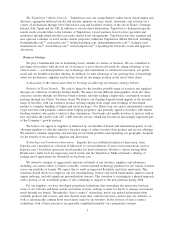Expedia 2007 Annual Report Download - page 21
Download and view the complete annual report
Please find page 21 of the 2007 Expedia annual report below. You can navigate through the pages in the report by either clicking on the pages listed below, or by using the keyword search tool below to find specific information within the annual report.regulations; diminished ability to legally enforce our contractual rights; increased risk and limits on our ability
to enforce intellectual property rights; possible preferences by local populations for local providers; restrictions
on the withdrawal of non-U.S. investment and earnings; currency exchange restrictions; slower adoption of the
internet as an advertising, broadcast and commerce medium in those markets as compared to the United States
and difficulties in managing staffing and operations due to distance, time zones, language and cultural
differences.
Changing laws, rules and regulations and legal uncertainties may adversely affect our business or
financial performance.
Our business and financial performance could be adversely affected by unfavorable changes in or
interpretations of existing, or the promulgation of new laws, rules and regulations applicable to us and our
businesses, including those relating to the internet and online commerce, consumer protection and privacy.
Such unfavorable changes could decrease demand for products and services, increase costs and/or subject us to
additional liabilities. For example, there is, and will likely continue to be, an increasing number of laws and
regulations pertaining to the internet and online commerce, which may relate to liability for information
retrieved from or transmitted over the internet, user privacy, taxation and the quality of products and services.
Furthermore, the growth and development of online commerce may prompt calls for more stringent consumer
protection laws that may impose additional burdens on online businesses generally.
Adverse application of tax laws, rules or regulations could have an adverse effect on our businesses
and financial performance.
The application of various domestic and international sales, use, occupancy, value-added and other tax
laws, rules and regulations to our historical and new products and services is subject to interpretation by the
applicable taxing authorities. Many of the fundamental statutes and regulations that impose these taxes were
established before the growth of the internet and e-commerce. If the tax laws, rules and regulations were
amended, if new adverse laws, rules or regulations were adopted, or if current laws are interpreted adversely
to our interests, particularly with respect to occupancy or value-added taxes, the results could increase our tax
payments (prospectively or retrospectively) and/or subject us to penalties and decrease the demand for our
products and services if we pass on such costs to the consumer. As a result these changes could have an
adverse affect on our businesses or financial performance. We continue to work with relevant tax authorities
and legislators to clarify our obligations under existing, new and emerging laws and regulations. There have
been, and will continue to be, substantial ongoing costs associated with complying with, and defending our
position in, the various indirect tax requirements in the numerous markets in which we conduct or will conduct
business.
System interruption and the lack of redundancy in our information systems may harm our
businesses.
We rely on computer systems to facilitate and process transactions. We have experienced and may in the
future experience system interruptions that make some or all of these systems unavailable or prevent us from
efficiently fulfilling orders or providing services to third-parties. Any interruptions, outages or delays in our
systems, or deterioration in their performance, could impair our ability to process transactions and decrease
our quality of service that we can offer to our travelers. If we were to experience frequent or persistent system
failures, our reputation and brands could be harmed.
In addition, we do not have backup systems or contingency plans for certain critical aspects of our
operations or business processes, many other systems are not fully redundant and our disaster recovery or
business continuity planning may not be sufficient. Fire, flood, power loss, telecommunications failure, break-
ins, earthquakes, acts of war or terrorism, acts of God, computer viruses, physical or electronic break-ins and
similar events or disruptions may damage or impact or interrupt computer or communications systems or
business processes at any time. Although we have put measures in place to protect certain portions of our
facilities and assets, any of these events could cause system interruption, delays and loss of critical data, and
could prevent us from providing services to our travelers and/or third parties for a significant period of time.
Remediation may be costly and we may not have adequate insurance to cover such costs. Moreover, the costs
15
























